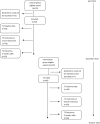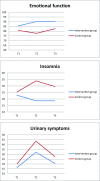Early detection and management of symptoms using an interactive smartphone application (Interaktor) during radiotherapy for prostate cancer
- PMID: 28236145
- PMCID: PMC5445148
- DOI: 10.1007/s00520-017-3625-8
Early detection and management of symptoms using an interactive smartphone application (Interaktor) during radiotherapy for prostate cancer
Abstract
Purpose: Patients undergoing radiotherapy for prostate cancer suffer from a variety of symptoms which influence health-related quality of life. We have developed an application (Interaktor) for smartphones and tablets for early detection, reporting and management of symptoms, and concerns during treatment for prostate cancer. The study evaluates the effect on symptom burden and quality of life when using the application for real-time symptom assessment and management during radiotherapy for localized prostate cancer.
Methods: A non-randomized controlled study was used at two university hospitals in Sweden where 64 patients constituted a control group and 66 patients made up an intervention group. The intervention group was asked to report symptoms via the application daily during the treatment as well as 3 weeks after. The EORTC QLQ-C30 and its module PR25 and the Sense of Coherence questionnaire were administered at three time points in both groups.
Results: The intervention group rated significantly lower levels of fatigue and nausea at the end of radiotherapy. Moreover, they had significantly less burden in emotional functioning, insomnia, and urinary-related symptoms at the end of treatment as well as 3 months later compared with the control group. In the multivariate analyses, with education and sense of coherence as covariates, the intervention group still significantly rated emotional functioning (p = 0.007), insomnia (p = 0.017), and urinary-related symptoms (p = 0.008) as better than the control group at T2.
Conclusion: Study findings suggest that Interaktor could be an efficient mHealth tool for facilitating supportive care needs during cancer treatment.
Keywords: Interactive smartphone application; Prostate cancer; Radiotherapy; Symptom management; Symptom reporting.
Conflict of interest statement
The authors declare that they have no conflicts of interest. The first author has full control of all primary data and agrees to allow the journal to review the data if requested.
Figures
Similar articles
-
Image guided hypofractionated radiotherapy and quality of life for localized prostate cancer: prospective longitudinal study in 337 patients.J Urol. 2013 Jun;189(6):2099-103. doi: 10.1016/j.juro.2013.01.005. Epub 2013 Jan 9. J Urol. 2013. PMID: 23313200
-
Effects of an interactive mHealth innovation for early detection of patient-reported symptom distress with focus on participatory care: protocol for a study based on prospective, randomised, controlled trials in patients with prostate and breast cancer.BMC Cancer. 2017 Jul 4;17(1):466. doi: 10.1186/s12885-017-3450-y. BMC Cancer. 2017. PMID: 28676102 Free PMC article.
-
Health-related quality of life in men after treatment of localized prostate cancer with external beam radiotherapy combined with (192)ir brachytherapy: a prospective study of 93 cases using the EORTC questionnaires QLQ-C30 and QLQ-PR25.Int J Radiat Oncol Biol Phys. 2004 Sep 1;60(1):51-9. doi: 10.1016/j.ijrobp.2004.02.004. Int J Radiat Oncol Biol Phys. 2004. PMID: 15337539
-
Patient-reported outcome (PRO) questionnaires for men who have radical surgery for prostate cancer: a conceptual review of existing instruments.BJU Int. 2017 Oct;120(4):468-481. doi: 10.1111/bju.13896. Epub 2017 May 30. BJU Int. 2017. PMID: 28437031 Review.
-
Symptoms and self-care strategies during and six months after radiotherapy for prostate cancer - Scoping the perspectives of patients, professionals and literature.Eur J Oncol Nurs. 2016 Apr;21:139-45. doi: 10.1016/j.ejon.2015.09.004. Epub 2015 Oct 21. Eur J Oncol Nurs. 2016. PMID: 26482003
Cited by
-
Mobile applications in radiation oncology-current choices and future potentials.Strahlenther Onkol. 2023 Apr;199(4):337-349. doi: 10.1007/s00066-023-02048-y. Epub 2023 Feb 21. Strahlenther Onkol. 2023. PMID: 36810957 Free PMC article.
-
Patients' Experiences of Care With or Without the Support of an Interactive App During Neoadjuvant Chemotherapy for Breast Cancer: Interview Study.JMIR Nurs. 2022 Aug 11;5(1):e39983. doi: 10.2196/39983. JMIR Nurs. 2022. PMID: 35969443 Free PMC article.
-
eHealth-Based Interventions for Older Patients with Prostate Cancer: A Quick Review of the Literature.Telemed Rep. 2022 Mar 17;3(1):79-92. doi: 10.1089/tmr.2021.0048. eCollection 2022. Telemed Rep. 2022. PMID: 35720442 Free PMC article. Review.
-
Feasibility, usability and acceptance of weekly electronic patient-reported outcomes among patients receiving pelvic CT- or online MR-guided radiotherapy - A prospective pilot study.Tech Innov Patient Support Radiat Oncol. 2021 Dec 15;21:8-15. doi: 10.1016/j.tipsro.2021.12.001. eCollection 2022 Mar. Tech Innov Patient Support Radiat Oncol. 2021. PMID: 34977367 Free PMC article.
-
Associations of Coexisting Pain and Fatigue Severity with Physical Performance and Quality of Life Among Middle-Aged and Older Individuals with Chronic Knee Pain: Secondary Analysis of a Randomized Clinical Trial.Pain Med. 2021 Nov 26;22(11):2575-2583. doi: 10.1093/pm/pnab115. Pain Med. 2021. PMID: 33772557 Free PMC article. Clinical Trial.
References
-
- LaSpina M, Haas GP. Update on the diagnosis and management of prostate cancer. Can J Urol. 2008;15(Suppl 1):3–13. - PubMed
-
- Fransson P, Lund JA, Damber JE, Klepp O, Wiklund F, Fossa S, Widmark A, Scandinavian Prostate Cancer Group S. Swedish Association for Urological O Quality of life in patients with locally advanced prostate cancer given endocrine treatment with or without radiotherapy: 4-year follow-up of SPCG-7/SFUO-3, an open-label, randomised, phase III trial. Lancet Oncol. 2009;10(4):370–380. doi: 10.1016/S1470-2045(09)70027-0. - DOI - PubMed
-
- Blomberg K, Wengström Y, Sundberg K, Browall M, Isaksson AK, Nyman MH, Langius-Eklöf A. Symptoms and self-care strategies during and six months after radiotherapy for prostate cancer - scoping the perspectives of patients, professionals and literature. Eur J Oncol Nurs. 2016;21:139–145. doi: 10.1016/j.ejon.2015.09.004. - DOI - PubMed
MeSH terms
LinkOut - more resources
Full Text Sources
Other Literature Sources
Medical



